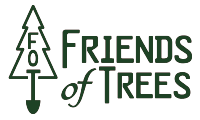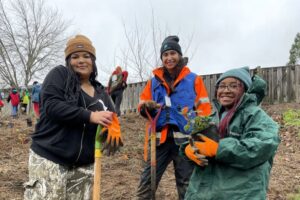Category: Partnerships
Partner Spotlight: Verde
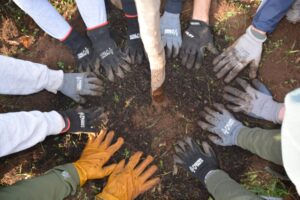
Verde is part of the 11-member coalition for our IRA Community Forestry Grant
We recently had the chance to connect with one of our partners about the opportunities the community forestry coalition affords. After speaking with Amandeep Sohi, Community Engagement Coordinator at Verde, it’s clear that their organization is striving to make a difference in the community.
Verde serves communities by building environmental wealth through social enterprise, outreach, and advocacy. Friends of Trees and Verde have been partners long before this coalition. In recent years, Verde helped Friends of Trees lead our first Spanish-speaking tree planting event. They also assisted in gathering volunteers and training five Latinx women to become planting crew leaders.
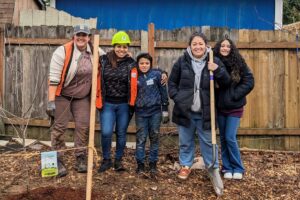
“When we talk about environmental wealth, we’re talking about access to green spaces and people’s ability to go into nature,” Amandeep said. “Not necessarily big, destination-parks, but also pocket parks right by our homes that we can walk to. We want to connect people to those spaces and opportunities—community gardens, naturescapes, and tree planting.”
Verde is part of the 11-member coalition led by Friends of Trees that was awarded a $12 million Urban and Community Forestry Grant from the U.S. Department of Agriculture as part of the Inflation Reduction Act grants. The grant will fund community forestry work including tree planting, natural area restoration, post-planting care, community education, opportunities for direct community input and participation, and workforce training.
Amandeep also spoke to the importance of working in these particular neighborhoods. “It’s super exciting to be working in Justice40 neighborhoods. Planting trees and native shrubs really impacts peoples lives and doing it together builds community.” The Justice40 Initiative is a goal enacted by the Biden Administration to deliver at least 40 percent of the overall investments from key federal investments to disadvantaged communities.
As for the future of the coalition, Verde is excited to work with all of the partners. “Every partner touches on different communities, different aspects of green spaces. Depave is breaking up asphalt and pavement to mitigate heat island effects. Wisdom of the Elders is bringing indigenous knowledge and ways of stewarding the land back to our communities. We’re hoping to tap into our partners’ expansive communities to reach a diverse group of participants.”
Partner Spotlight: APANO
APANO is part of our IRA Community Forestry Grant’s 11-member coalition
For Alisa Kajikawa, it’s all about finding the balance of working toward the dream and working for the present. She’s APANO’s Community Development Manager for the Jade District, and we spoke to her about APANO’s vision for the community forestry coalition.
APANO is part of the 11-member coalition led by Friends of Trees that was awarded a $12 million Urban and Community Forestry Grant from the U.S. Department of Agriculture as part of the Inflation Reduction Act grants. The grant will fund community forestry work including tree planting, natural area restoration, post-planting care, community education, opportunities for direct community input and participation, and workforce training.
APANO unites Asians and Pacific Islanders to build power, develop leaders, and advance equity through organizing, advocacy, community development and cultural work. Their coalition work will be geared toward education and outreach, workforce development, and community infrastructure.
“We can’t grow canopy overnight,” Alisa says. “What can we do now that will still help alleviate pollution and heat in our community?”
For APANO, it means a few things, like working with businesses in the Jade district to host planter boxes filled with native plants. It means hosting community workshops on environmental justice and heat impacts. And it means thinking big picture about creating a transportation system that doesn’t rely on cars.
Alisa is excited about all the possibilities that the coalition can bring.
“When have we ever had 11 different organizations coming together as one coalition for a cohesive goal? It’s really awesome,” she says. “Hopefully this is a case study for the future, showing what happens when we stop working in silos and work toward a shared goal in different ways.”
Partner Spotlight: POIC
POIC is part of the 11-member coalition for our IRA Community Forestry Grant
On a sunny Saturday morning at Gateway Green Park, volunteers gathered to plant native plants on the wooded hillside of the park. Many of the volunteer crews were led by quiet but capable young folks from POIC.
Portland Opportunities Industrialization Center (POIC) connects high school youth with career training, including partnering with Friends of Trees. POIC students train as crew leaders and lead Friends of Trees plantings throughout the season. Gateway Green was this cohort’s fifth event overall this season, and second as crew leaders.
“This season is going great,” says Leigh Rappaport, Program Manager for POIC’s Natural Resource Pathway. “They’re a really committed group. They care about what they’re doing and are thoughtful about making sure volunteers are having a good time.”

POIC is part of the 11-member coalition led by Friends of Trees that was awarded a $12 million Urban and Community Forestry Grant from the U.S. Department of Agriculture as part of the Inflation Reduction Act grants. The grant will fund community forestry work including tree planting, natural area restoration, post-planting care, community education, opportunities for direct community input and participation, and workforce training.
Part of the grant will help fund POIC’s natural resource training for five years. “Having this funding gives us room to breathe” Leigh says. “We can really focus on the program.”
Beyond that, Leigh looks forward to all of the partnerships that will grow out of this expansive and collaborative project.
“We’re excited to be part of a coalition being built from the ground up.”
Creando eventos inclusivos de siembra de árboles en el noreste de Portland
Con Verde, Friends of Trees realizó su primer evento dirigido en español
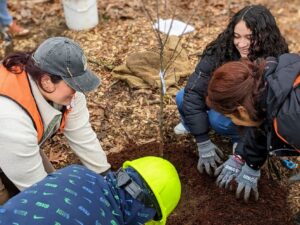
Mientras plantaba árboles en una casa sobre Going Street en el noreste de Portland, Bella le recordó a su madre María que quería hablar español durante todo el evento. Su mamá sonrió y le pasó su pregunta a la líder de equipo, Ana, en español. Todos los integrantes de este equipo en particular eran bilingües, pero adoptaron el espíritu del evento y lo dirigieron en español.
Si bien Friends of Trees ha tenido equipos dirigidos en español en eventos anteriores, esta siembra fue el primer evento dirigido en español. Friends of Trees se asoció con Verde para planificar el evento y reclutar voluntarios.
“Fue nuestro primer anuncio inaugural en español, nuestra primera reunión de líderes de equipo en español”, dijo Andrew Land, especialista principal de Neighborhood Trees, líder de siembra del evento y uno de los varios miembros del personal de Friends of Trees que habla español.
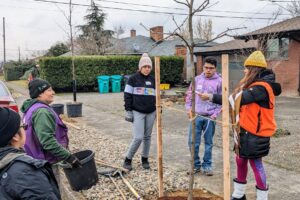
Todos los líderes del equipo eran Líderes Verdes, un programa de Verde que apoya el desarrollo de liderazgo de la comunidad latina de Cully. Los líderes de equipo como Ana organizaron las sembradoras, distribuyeron las herramientas y demostraron las técnicas de siembra completamente en español.
“Tenemos muchas personas en nuestros eventos que son bilingües, pero me encanta que le dimos la vuelta y lo dirigimos en español”, dijo Andrew. “Nos permite poner a los hispanohablantes de lleno en su zona de confort”.
El evento fue más pequeño e íntimo que la mayoría de las siembras en nuestro vecindario, pero aun así fue una mañana vivaz y productiva. Cuatro equipos sembraron 32 árboles y celebraron comiendo un pozole.
“Quisimos mantenerlo pequeño, para asegurarnos de que todo saliera bien”, dijo Andrew. “Salió genial, y espero que este sea el primero de muchos eventos en español”.

Esta siembra es parte del proyecto Clean Air Canopy. Cuando una planta de vidrio del noreste de Portland llegó a un acuerdo con el DEQ de Oregón en relación con el cumplimiento de su permiso de calidad del aire, una parte de la sanción aportó fondos para proyectos ambientales locales aprobados, incluyendo la siembra de árboles. Friends of Trees, con los socios Verde, Cully Association of Neighbors y Cully Air Action Team, se han enfocado en asegurarse de que estas siembras sean beneficiosas e inclusivas para las comunidades a las que sirven.
Share the Knowledge
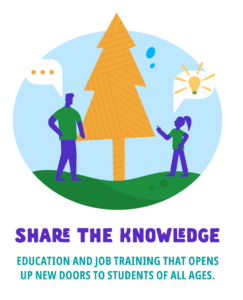
Friends of Trees’ partnerships contribute to environmental education for K-12 students; adult job training programs; paid internships connecting underserved communities to the urban forestry field; greening low canopy neighborhoods; and so much more.
“Thank you for letting us come and plant with you, it was a GREAT experience. I learned that planting trees keeps us healthy and alive. It was a great opportunity to learn and also to be outside.” Kara, 4th grade, Friends of Trees-Charles F. Tigard Elementary School partnership
“American children now spend an average of only four to seven minutes per day playing outdoors, compared with over seven hours per day in front of a screen.” (National Recreation and Park Association) That alone justifies our work with more than 2,000 young people in a typical season.
Friends of Trees’ educational programming actively and meaningfully connects youth of all ages with nature. We’re in the classroom with information about the benefits of trees, and we’re outside, actively planting and caring for trees with young people. Our work with high school students includes leadership skill building and job training through paid internships.
“I got so much out of this experience. One of the biggest things was building my confidence and helping me have a voice. When I first started Crew Leading I thought there was no way that older people would actually listen to me when I tried to explain how to do things. But they did! And I made so many connections with people I would have otherwise never talked to.” Angelica, Rosemary Anderson High School/POIC student; Friends of Trees’ youth program participant
We have longstanding partnerships with Portland Opportunities Industrialization Center and The Blueprint Foundation’s Grounding Waters Program through which high school student interns receive stipends for job-training—including leadership opportunities—with Friends of Trees.
Our work with elementary and middle school students includes hands-on, outdoor field work combined with classroom curriculum. As part of our EDI efforts we conduct an EDI training for the teachers we partner with, emphasizing equal access to trees; safe spaces; welcoming & inclusive language; how to respond to problematic language.
Learn more about our partnership with The Blueprint Foundation:
Read a variety of stories about our youth education programming here.
Read about our Adult Workforce Training program here, and learn more here:
